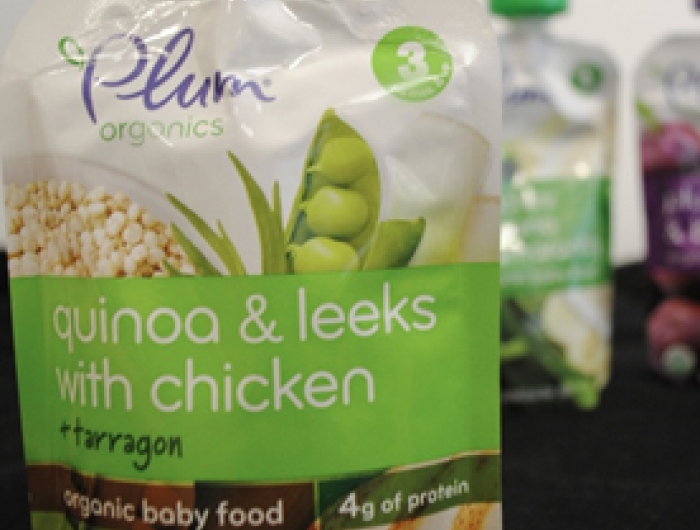Plum Organics, Gerber accused of bait-and-switch schemes on baby food labels

CSPI notifies companies of potential lawsuits if deceptive marketing continues
Plum Organics boasts of healthful and trendy ingredients such as kale, quinoa, blackberry, and Greek yogurt on labels of its baby food pouches, when in fact the pouches typically contain cheaper and less nutritious apple puree or even water as the first ingredients. The nonprofit Center for Science in the Public Interest has notified Plum Organics, a unit of Campbell Soup Company, that it will be sued if it does not stop deceiving consumers by misrepresenting the presence and proportions of its baby food ingredients.
CSPI also notified Gerber that it, too, will face a lawsuit if it continues what CSPI says are deceptive labeling practices of its baby and toddler foods. Gerber, a unit of Nestle, bulks up its 3rd Foods Lasagna with Meat Sauce Dinner with the unexpected addition of inexpensive pear juice, according to the group. Similarly, Gerber uses inexpensive apple juice, an ingredient not mentioned or pictured on the fronts of the labels, to bulk up its 2nd Foods Banana Peach Granola and 2nd Foods Pear Blueberry Oatmeal.
Consumers might assume kale is the first ingredient in Plum’s Kale, Apple & Greek Yogurt, according to CSPI. Yet kale puree is actually the fourth ingredient behind apple puree, water, and pasteurized yogurt (that is, yogurt with no healthful live bacteria). Consumers might similarly expect that green beans are a major component of Plum’s Green Bean, Pear & Greek Yogurt pouches. Yet green beans are among the least predominant ingredients in this product, behind water, apple puree, and banana puree. The ingredient list for Plum’s Quinoa & Leeks with Chicken + Tarragon baby food pouch lists five ingredients, first among them water, before listing quinoa, leeks, or chicken. Chicken and quinoa are the sixth and seventh ingredients listed; leeks are the ninth.
“Plum is cynically exploiting parents’ desire to get the best for their babies,” said CSPI litigation director Maia Kats. “In most cases, these baby food pouches are filled with cheap, watered down apple puree—and only have token amounts of the specified kale or blueberry or quinoa.”
Plum Organics baby food costs around $1.59 for 3.5- or 4-ounce pouches.
Plum also deceives consumers on labels for the pouches, bars, smoothies, and snacks it markets for toddlers, according to CSPI. One variety of Mighty 4 Essential Nutrition Blends, listspumpkin, pomegranate, quinoa, and Greek yogurt on the front. But sugary apple puree, starchy banana puree, and water are the first three ingredients by volume. Likewise, the filling in Plum’s Mighty 4 Essential Nutrition Bar Blueberry with Carrot is mostly evaporated cane syrup and brown rice syrup—both forms of sugar—and apple powder. The nearly illegible ingredients list shows that the product contains more rice starch than blueberries or carrots. One of Plum’s Super Smoothies lists blueberry first in the product’s name on the front of the label, but it’s actually only the sixth ingredient.
Boxes of Plum’s Teensy Fruits Berry depict pictures of blueberries, raspberries, and a strawberry, but the actual candies have apple puree concentrate and apple juice concentrate as the first and second ingredients. (Apples aren’t even pictured on the box.) The Teensy Fruits labels also claim to have “a full serving of fruit,” though a real serving of fruit would typically contain more fiber than Plum’s fruit-flavored candies.
Plum Organics’ Fruit & Grain Mish Mash Blueberry, Oats & Quinoa has more apple puree and banana puree than it has blueberry, oats, or quinoa.
In its notifications to Plum and Gerber, CSPI said the products violate several states’ consumer protection laws and are also misbranded under federal law. Michael Reese and George Granade of the law firm Reese LLP will serve as co-counsel alongside CSPI litigation director Maia Kats in both cases.
“Plum and Gerber are cheating parents financially, and robbing kids nutritionally, with these elaborate bait-and-switch schemes,” CSPI executive director Michael F. Jacobson said. “If they were actually proud of the major ingredients in their products, wouldn’t they name them on the front of their packages?”
Twenty years ago a CSPI report, “Cheating Babies,” exposed Gerber and other baby foods for containing up to 70 percent water and starch. That led to major improvements in the industry.

